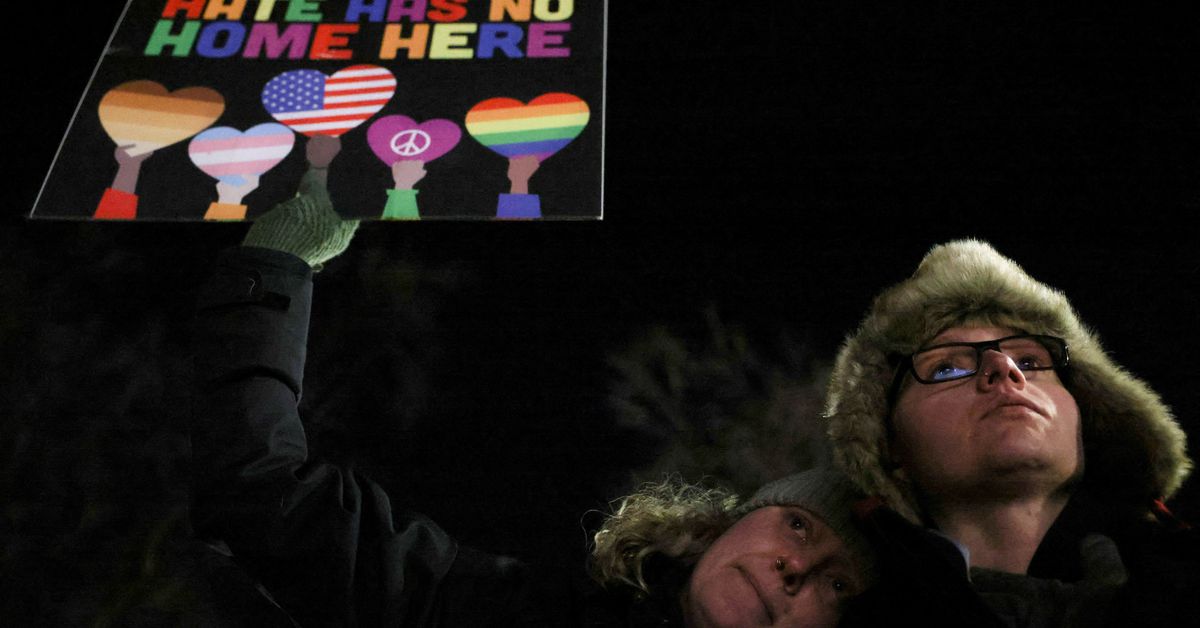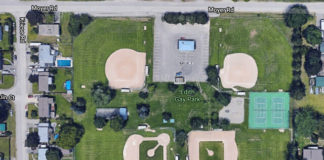/cloudfront-us-east-2.images.arcpublishing.com/reuters/JKAFCE5CVFPJXFZ3LCBC6X33SA.jpg)
NEW YORK, Nov 23 (Reuters) – After the 2016 massacre at the Pulse nightclub in Florida, the owners of New York City gay bar C’mon Everybody hired more security staff, and the LGBT landmark Stonewall Inn ran active-shooter safety drills with its bartenders.
Those bars and other LGBT spaces around the country are again weighing how to keep their staff and patrons safe after a gunman killed five people and injured 17 more at an LGBT club in Colorado Springs. Many worry that physical security measures can only go so far, and that staunching a surge of inflammatory anti-LGBT rhetoric is a better tactic.
The Club Q attack, which is being investigated as a hate crime, has compounded the fear and anger of a community already confronting a wave of Republican legislation directed at transgender youth and gay Americans, and what they say is a related rise in threats and violence against its members.
“It’s really tiring for the gay community that time and time again we have to come up with the solutions for problems that other people make,” said Jonathan Hamilt, executive director of Drag Queen Story Hour, a nonprofit group that organizes drag performers reading books to children in 45 states that has been repeatedly targeted and threatened this year.
“We want to gather and dance, and people want to shoot and kill us,” Hamilt said. “Why is there so much that is being asked of us?”
Just hours before the attack at Club Q in Colorado Springs, someone threw a brick through the window of gay bar Vers in the Hell’s Kitchen neighborhood of New York City for the fourth time this month, according to police. Erik Bottcher, the city council member representing Hell’s Kitchen, has joined other officials over the last week to warn that one or more people are drugging and robbing gay men in the neighborhood.
In response to those attacks and the Colorado shooting, the Anti-Violence Project, a non-profit group founded in 1980 after a spate of attacks on gay men, plans to hold a safety event at a Hell’s Kitchen gay bar on Wednesday night. Volunteers will talk with staff and patrons about ways to heighten vigilance in bars, on hook-up and dating apps, and with partners at home.
The attack on the Pulse gay nightclub in Orlando six years ago, during which a man shot dead 49 people, forced many bars to review their security plans.
“It was definitely an eye-opening moment,” said Eric Sosa, co-owner of C’mon Everybody and Good Judy in New York City. “We started having security onsite seven days a week.”
He recently switched to using what he described as a queer-owned security firm, which he felt was better placed to hire the sort of “firm but caring” bouncers his patrons would want to meet at the door.
But as queer venues grapple with safety, several LGBT activists and club owners said no amount of security personnel or technology would protect them from the anti-LGBT rhetoric they blame for stoking such violence.
Several Republican-controlled states have proposed or passed laws that ban teachers from discussing sexual orientation with younger students or criminalize doctors who perform certain medical interventions for transgender minors.
In Florida, supporters of the new law restricting teachers said it was designed to keep them from talking about topics young kids were not ready to process. In Texas, Governor Greg Abbott has said he is trying to protect children from abuse by prohibiting many types of gender-affirming medical care for minors.
Stacy Lentz, a co-owner of Stonewall Inn, the site of the 1969 riots that catalyzed the gay liberation movement, echoed others in the industry in saying venues are reaching the limits of what physical defenses can achieve.
“You’re not going to stop a man with an AR-15 who really wants to come in. They’ll just shoot the security guard and that’s it, right?” she said. “We’ve got to work, really work to get the far right to tone down this rhetoric. Hate shouldn’t be a political strategy.”
Steven Raimo, a drag artist who has performed as Veronika Electronika in Nashville, Tennessee, for two decades, has given up organizing in-person Drag Queen Reading Hour events, saying it is too dangerous because of the threat of protesters, some armed with guns. A state senator in Tennessee has introduced a bill that would criminalize drag performances in the presence of children.
Raimo still performs for adults, including a drag bingo night he was hosting on Tuesday at a Nashville gay bar.
“The idea of a safe space really doesn’t exist,” Raimo said. “You can have as many armed security guards as you like, but it doesn’t guarantee a safe space and it doesn’t guarantee the lives of everyone in that room will continue.”
Read more:
With books and jewels, drag queens teach children tolerance
From school boards to statehouses, conservative Moms for Liberty push to grow influence
Reporting by Jonathan Allen
Editing by Colleen Jenkins and Lisa Shumaker
Our Standards: The Thomson Reuters Trust Principles.








